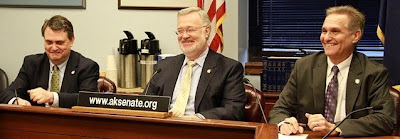Chairman Egan, and Sens. Stevens, Davis, and Paskvan were all present for the budget closeout on Tuesday, March 15. The subcommittee accepted the governor’s budget for the most part. This is good news for people concerned about reductions made in the house. If this budget passes the senate, then it sets the ceiling for the conference committee. The conference committee will settle on numbers somewhere between what the house passes and what the senate passes. They cannot exceed the highest amount passed. In addition to funding in the operating budget, any legislation passed with fiscal notes that have operating expenses will have those fiscal notes tacked onto the operating budget. So for instance, If HB 49, Rep. Tuck’s Parents as Teachers bill passes the legislature, the DEED fiscal note, which is currently $3.9 million, will be tacked onto the operating budget. And then it has to pass the red pen gauntlet, along with all the other line items in the budget.
Chairman Egan said the administration presented them with a responsible budget, but they made a few changes.
Jesse Kiehl, aide to Chairman Egan, reviewed those changes:
• Add $87,500 in general funds to the Alaska State Council on the Arts to fully fund the required National Endowment for the Arts match. Additional funding will be used to expand the Artists in the Schools Program to reach more Alaska children.
• Remove $8,000 in general funds from travel for the Compact for the Education of Military Children. When the legislature first passed the bill joining the compact, the fiscal note was zero, with instruction to DEED that costs were to be absorbed.
• Remove $18,300 in general funds from the adjusted base in the travel line for travel for the state board, the commissioner, and the deputy commissioner. Travel spending actuals have exceeded the budgeted amount. This level of funding is approximately $40,000-50,000 less than recent years' actuals. The department says they can operate at this funding level without shifting other funding.
Mr. Kiehl said one other important change is a net zero reallocation from the governor’s request. There is consistently unmet need in the AlaskAdvantage Grant Program. There has been significant discussion in the subcommittee about equal opportunity for students across the state, and for actual Alaska data, not data based on other states’ scholarship programs. The subcommittee report includes a memorandum prepared by Sen. Paskvan that discusses the issue. The subcommittee recommends funding the Alaska Performance Scholarship with $1.1 million to enable DEED to move forward on collecting Alaska data and with pro-rata reduced awards. The recommendation on those two counts is:
• Increase general funds of $7,121,900 to the AlaskAdvantage Grant Program
• Reduce general funds of $7,121,900 from the Alaska Performance Scholarship Program
Sen. Davis asked if there was grant funding for Best Beginnings. Mr. Kiehl said yes. In FY 11 the legislature provided $600,000 for early education grants to DEED. The department split that equally between Best Beginnings and Parents as Teachers, and will continue to do so. The teacher mentoring program is funded at the governor's request level. He said $380,000 in additional funding was added to that amount last year, but this year it is just funded at $600,000.
Sen. Davis said she would like to see that extra money put back in the budget. They need to do everything possible for Pre-K. She said she would propose an amendment if anyone would agree to it.
Chairman Egan asked the department to comment on the proposed amendment. Anna Kim, director, Div. of Administrative Services, DEED, said it's an interesting proposal, but they support the governor's original budget.
Sen. Stevens said he was concerned about Pre-K funding and the teacher mentoring program, and the subcommittee has addressed his main concerns.
The other subcommittee members did not agree to Sen. Davis’ amendment. Sen. Davis said she’s okay with what they've advocated, and that her concerns will be addressed further down the line.









